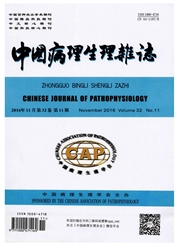

 中文摘要:
中文摘要:
G蛋白偶联受体(G-protein-coupled receptors,GPCRs)是与G蛋白偶联的膜受体,也是目前已知最大的细胞膜受体家族。GPCRs能够被不同配体所激活,可将激素、神经递质、药物、趋化因子以及光线等多种化学性和物理性细胞外信号转导入细胞内,在多种生理活动和病理过程中发挥重要的调节作用。GPCRs被认为是高血压、心力衰竭、帕金森氏综合症等多种疾病的药物治疗靶点,市售药物约50%都是以GPCRs为靶点的[1]。
 英文摘要:
英文摘要:
G-protein-coupled receptors(GPCRs) are hitherto the largest family of membrane receptors.They activate associated heterotrimeric G-proteins and participate in the regulation of intracellular signaling pathways,which are accomplished via ligand binding to them.G-protein-coupled receptor kinases(GRKs) are key modulators of GPCR signaling.GRKs,in concert with β-arrestins,classically lead to desensitization and internalization of GPCR,thus preventing hyperactivation of GPCR second messenger cascades.Changes in the GRKs expression and regulation have featured prominently in many cardiovascular diseases,including heart failure,myocardial infarction,cardiac hypertrophy,and hypertension.Intensively studying the role of GRKs in cardiovascular diseases contributes to expounding the mechanism of correlated diseases.Herein,we review the role of GRKs in cardiovascular pathophysiology.
 同期刊论文项目
同期刊论文项目
 同项目期刊论文
同项目期刊论文
 D-beta-Hydroxybutyrate inhibited the apoptosis of PC12 cells induced by H2O2 via inhibiting oxidativ
D-beta-Hydroxybutyrate inhibited the apoptosis of PC12 cells induced by H2O2 via inhibiting oxidativ 期刊信息
期刊信息
